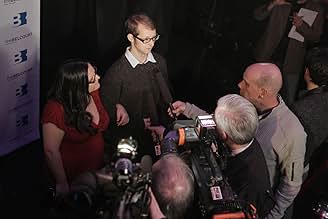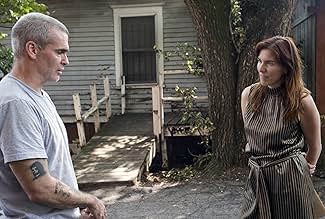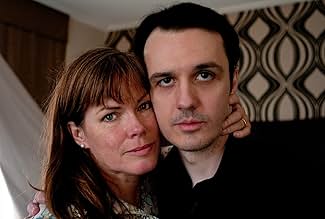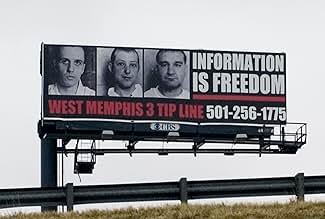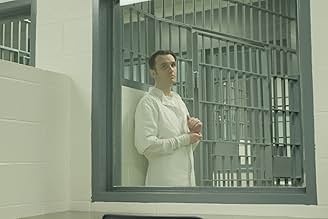An examination of a failure of justice in the case against the West Memphis Three.An examination of a failure of justice in the case against the West Memphis Three.An examination of a failure of justice in the case against the West Memphis Three.
- Nominated for 1 BAFTA Award
- 1 win & 10 nominations total
Jessie Misskelley
- Self
- (as Jessie Miskelly)
Michael Baden
- Self - Former New York City Chief Medical Examiner
- (as Dr. Michael Baden)
Jamie Clark Ballard
- Self - Neighbor of Stevie Branch
- (as Jamie Ballard)
Steve Braga
- Self - Damien Echols' Attorney
- (as Stephen Braga)
David Burnett
- Self - Trial Judge
- (as Judge David Burnett)
John Mark Byers
- Self - Christopher Byers' Father
- (as Mark Byers)
The Chicks
- Themselves
- (archive footage)
- (as Dixie Chicks)
Heather Crawford
- Self - TV News Anchor
- (archive footage)
- Director
- Writers
- All cast & crew
- Production, box office & more at IMDbPro
Featured reviews
Martin Luther King said, "The arc of history is long but it bends toward justice." Justice has been a long-time coming for Damien Echols, Jason Baldwin and Jessie Misskelley, three marginalized teenagers wrongfully convicted of the 1993 murders of three eight-year-olds: Steven Branch, Michael Moore and Christopher Byers, found dead in a creek in West Memphis, Arkansas. The subject has been brought to the screen before in the "Paradise Lost" trilogy, yet the documentary West of Memphis, directed by Amy Berg and written by Billy McMillin, adds another dimension to our knowledge and understanding of the circumstances and the characters involved. It is a film of extraordinary power that has the ability to stir a range of emotions from frustration, anger, depression, to even joy.
After the victims were found beaten, bruised, and sexually mutilated, hysteria gripped the town and word circulated about the killings being the work of a satanic cult. Despite a lack of physical evidence, the accused teenagers were charged with three counts of capital murder and brought to trial. Damien Echols was sentenced to death, while Jason Baldwin and Jessie Misskelley both received life sentences. Jesse confessed to the crime but the audio recording of Jessie's interrogation reveals that the prosecution took advantage of the mildly retarded boy by feeding him the desired answers. Soon after the verdict was handed down much to the relief of the bereaved parents and frightened residents, critics of the case began to point to serious discrepancies in the evidence.
It was also found out later that many of the visible physical injuries were caused after the children's death by turtles living in the swamp. The subsequent media attention led to a twenty-year campaign to free the inmates who become known as the Memphis 3. West of Memphis includes archival footage of the trial and press reports, a police investigation video, and contemporary interviews with victim's families, supporters of the convicted men including their attorneys, and celebrities such as Johnnie Depp, Eddie Vedder, and filmmakers Peter Jackson and Fran Walsh. If not for the courage and, of course, the financial support of those who fought a long battle to overturn the convictions, Damian might have been executed years ago.
Of the three convicted men, much of the film's focus is on Damian, a self-educated and highly articulate young man, describing his correspondence and subsequent marriage to New York Landscape Architect Lorri Davis. Despite the community protest and continued investigation of the case that unearthed new evidence, particularly DNA evidence, it became increasingly apparent that the justice system in Arkansas would rather perpetuate a lie than admit serious mistakes and become vulnerable to a series of damage suits. Even though he is presented with overwhelming evidence for a new trial, the original judge, David Burnett (now a state senator) refused to reconsider the case.
As a result of the continued pressure by those working for the boys' release, another suspect emerges who has never been investigated before and was the last person seen with the murdered boys. The thrust of this new lead propels West of Memphis toward a dramatic and surprising conclusion. Although some of the tactics of the investigation are open to question, such as filming a young girl's session with a psychiatrist and recording a private telephone conversation, West of Memphis is a riveting experience that suggests incidents of injustice and abuse of power such as this may be more common than we think.
After the victims were found beaten, bruised, and sexually mutilated, hysteria gripped the town and word circulated about the killings being the work of a satanic cult. Despite a lack of physical evidence, the accused teenagers were charged with three counts of capital murder and brought to trial. Damien Echols was sentenced to death, while Jason Baldwin and Jessie Misskelley both received life sentences. Jesse confessed to the crime but the audio recording of Jessie's interrogation reveals that the prosecution took advantage of the mildly retarded boy by feeding him the desired answers. Soon after the verdict was handed down much to the relief of the bereaved parents and frightened residents, critics of the case began to point to serious discrepancies in the evidence.
It was also found out later that many of the visible physical injuries were caused after the children's death by turtles living in the swamp. The subsequent media attention led to a twenty-year campaign to free the inmates who become known as the Memphis 3. West of Memphis includes archival footage of the trial and press reports, a police investigation video, and contemporary interviews with victim's families, supporters of the convicted men including their attorneys, and celebrities such as Johnnie Depp, Eddie Vedder, and filmmakers Peter Jackson and Fran Walsh. If not for the courage and, of course, the financial support of those who fought a long battle to overturn the convictions, Damian might have been executed years ago.
Of the three convicted men, much of the film's focus is on Damian, a self-educated and highly articulate young man, describing his correspondence and subsequent marriage to New York Landscape Architect Lorri Davis. Despite the community protest and continued investigation of the case that unearthed new evidence, particularly DNA evidence, it became increasingly apparent that the justice system in Arkansas would rather perpetuate a lie than admit serious mistakes and become vulnerable to a series of damage suits. Even though he is presented with overwhelming evidence for a new trial, the original judge, David Burnett (now a state senator) refused to reconsider the case.
As a result of the continued pressure by those working for the boys' release, another suspect emerges who has never been investigated before and was the last person seen with the murdered boys. The thrust of this new lead propels West of Memphis toward a dramatic and surprising conclusion. Although some of the tactics of the investigation are open to question, such as filming a young girl's session with a psychiatrist and recording a private telephone conversation, West of Memphis is a riveting experience that suggests incidents of injustice and abuse of power such as this may be more common than we think.
West of Memphis
This documentary, produced by Peter Jackson, examines the 1993 triple homicide of three eight-year-olds, investigation and trial of three teenagers and the subsequent efforts to overturn their conviction. While the story itself spans a 20-year period, this documentary focuses upon the most recent attempts at re-examining the evidence and freeing those convicted (one of whom confessed).
The story's already been told in HBO's "Paradise Lost" 1 - 3 (yep, this is the FOURTH doc on the subject), but this tale has been going on for twenty-years and has had multiple layers. If you haven't seen any of the other movies, or know nothing of the case, not to worry - West of Memphis does a fantastic job telling you the story from start to finish and in refreshing the memories for those of us to whom it's familiar.
I'm normally not bothered by graphic images, but my only complaint for this movie is the frequency of the explicit crime scene and autopsy photos of the victims - truly disturbing and haunting...I felt it was too much and took away from the film - the story itself, and sad realization that there were six actual victims, is overwhelming enough without being visually assaulted. I'm not one to normally feel the need to close my eyes or to look away, but here, I did.
And what a shame, by forcing me to look away, it forced me to tentatively recommend this film to everyone - it's tough to watch and revisiting how six children lost their lives is harrowing. While our country has the best justice system in the world, it's not perfect and works best for those who are able to afford the finest legal council money can buy (right, OJ?!) - in any case, "Justice delayed is justice denied".
I highly recommend it - but, I've warned you...it's tough.
This documentary, produced by Peter Jackson, examines the 1993 triple homicide of three eight-year-olds, investigation and trial of three teenagers and the subsequent efforts to overturn their conviction. While the story itself spans a 20-year period, this documentary focuses upon the most recent attempts at re-examining the evidence and freeing those convicted (one of whom confessed).
The story's already been told in HBO's "Paradise Lost" 1 - 3 (yep, this is the FOURTH doc on the subject), but this tale has been going on for twenty-years and has had multiple layers. If you haven't seen any of the other movies, or know nothing of the case, not to worry - West of Memphis does a fantastic job telling you the story from start to finish and in refreshing the memories for those of us to whom it's familiar.
I'm normally not bothered by graphic images, but my only complaint for this movie is the frequency of the explicit crime scene and autopsy photos of the victims - truly disturbing and haunting...I felt it was too much and took away from the film - the story itself, and sad realization that there were six actual victims, is overwhelming enough without being visually assaulted. I'm not one to normally feel the need to close my eyes or to look away, but here, I did.
And what a shame, by forcing me to look away, it forced me to tentatively recommend this film to everyone - it's tough to watch and revisiting how six children lost their lives is harrowing. While our country has the best justice system in the world, it's not perfect and works best for those who are able to afford the finest legal council money can buy (right, OJ?!) - in any case, "Justice delayed is justice denied".
I highly recommend it - but, I've warned you...it's tough.
There's no such thing as a nice murder, but the deaths of three children in West Memphs, Arkansas in 1993 seemed particularly horrific: the killer had apparently cut off his victim's penises and drunk their blood before throwing the corpses into a creek. The police promptly rounded up some local kids with a passing interest in Satanism, and a conviction as duly secured. Only later, amid mounting concerns over a potential miscarriage of justice, did it emerge that an incompetent pathologist had failed to recognise that the wounds were almost certainly inflicted post-mortem, and not by the killer, but by turtles. Not only had the wrong people been convicted of the crime, but the crime was perhaps just an "ordinary" murder after all. But getting the State to agree was a further long struggle. Amy Berg's documentary charts the story. It's horrific (the crime was still an awful one, even if not quite as originally portrayed, and the false imprisonment of the accused a second tragedy), fascinating, and beautifully filmed. On the downside, it is a bit long, and while it does a good job at suggesting who might have actually committed the crime, one can feel a bit uneasy about making such charges in a film like this (although one can also note that the authorities seemingly have no interest in re-investigating the case). More than anything else, the film is an interesting (and scary) look into the life of the American poor, a long way from the glitz of Manhattan. For many of the people we see in this movie, life would have been a hard, tough grind, even without the terrible events displayed. When one of the three accused finally gets out of prison, he tells us he isn't going back to Arkansas; and one doesn't feel like blaming him.
The 'West Memphis 3' were first brought to my attention back in 2007/2008 when I viewed the astonishingly eye-opening documentary Paradise Lost: The Child Murders at Robin Hood Hills (1996), which I watched back-to-back with its sequel Revelations: Paradise Lost 2 (2000). The case was so fascinating due to its unbelievable revelations of the flaws in the American justice system that I was more than happy to spend over 5 enthralling hours of my night watching it unravel. Those films brought mass attention to the case, due to the fact that the three accused - Damien Wayne Echols, Jason Baldwin and Jessie Misskelley - were so blatantly innocent of this terrible crime. I assumed justice would prevail, and it soon left my mind. So it was shocking to learn upon the release of the third instalment of the trilogy, Paradise Lost 3: Purgatory (2011), and this, West of Memphis, that these three were still in prison, 19 years after the murders, with everything from mere bureaucracy and political motivations standing in their, and thousands of others, way.
For those unacquainted with the case, back in 1993, the mutilated bodies of three young boys - Christopher Byers, Steven Branch and Michael Moore - were found in a stream in the Robin Hood Hills, West Memphis. With no evidence, prosecutors quickly deemed the murders a result of Satanic ritual, due to (apparently) sexual mutiliation, and sought out any locals known to practise such an art. They were given the names of three youngsters, Echols, Baldwin and Miskelley, who were known to listen to heavy metal music and act much like your typical isolated, 'gothic' teenagers. Through manipulation of the jury, and a trial by media, the three were quickly convicted (again, with no evidence against them, apart from a heavily dubious 'confession' by the borderline mentally retarded Misskelley). They were given life, with Echols possibly facing the death sentence. Interest in the case quickly gathered, due to many aspects not making any sense, and gathered support of musicians such as Metallica, Henry Rollins, Patti Smith, and Eddie Vedder of Pearl Jam. West of Memphis focuses on the fight to free the West Memphis 3, with new evidence gathered and possibly a revelation as to who the killer may actually be.
West of Memphis doesn't spend much time treading the same ground as the Paradise Lost trilogy, and quickly covers the original trial. It consists mainly of original footage, such as the lawyers and investigators funded by supporters of the West Memphis 3 and various celebrities such as the film's producers Peter Jackson and Fran Walsh trying to find fresh evidence in favour of the 3, and footage of the various concerts designed to raise awareness and make money. But where West of Memphis truly invigorates is the alarming case built against Terry Hobbs, stepfather of Steven Branch, who was all but ignored by police in the original investigation. Paradise Lost 2 brought up the possibility of another stepfather, John Mark Byers, being the culprit, but often felt like he was a suspect due to him simply being quite strange, which seems hypocritical considering the West Memphis 3 were convicted for the same reason. But there is strong evidence against Hobbs, such as a violent past, the lack of an alibi during the time of the deaths, and his hair being found within the knot of the shoelaces to which the three boys were hog-tied with.
Above all, West of Memphis is a staunch reminder of the darkness of this case. This was a horrific crime, almost beyond belief (and the sights of the three corpses really hammers this home), and an equally disturbing path of 'justice' that followed. This is a deep, dark stain on the American justice system, where political aspirations, ignorance and outright lying stand in the way of true justice. They do walk free in the end, but not without leaving a bitter taste in the mouth. They had 19 years of their life stolen from them, yet to be free they must plead guilty to a crime everyone knows they did commit. In the eyes of the law, the West Memphis 3 are child murderers, while the real murderer walks free with a clean name. The Paradise Lost films and West of Memphis, if anything, are a testament to the power of film, along with Errol Morris' The Thin Blue Line (1988), which exposed police ineptitude and helped set an innocent man free, but above all else, they are a terrifying and utterly depressing indictment of a country that needs to take a good look at itself.
www.the-wrath-of-blog.blogspot.com
For those unacquainted with the case, back in 1993, the mutilated bodies of three young boys - Christopher Byers, Steven Branch and Michael Moore - were found in a stream in the Robin Hood Hills, West Memphis. With no evidence, prosecutors quickly deemed the murders a result of Satanic ritual, due to (apparently) sexual mutiliation, and sought out any locals known to practise such an art. They were given the names of three youngsters, Echols, Baldwin and Miskelley, who were known to listen to heavy metal music and act much like your typical isolated, 'gothic' teenagers. Through manipulation of the jury, and a trial by media, the three were quickly convicted (again, with no evidence against them, apart from a heavily dubious 'confession' by the borderline mentally retarded Misskelley). They were given life, with Echols possibly facing the death sentence. Interest in the case quickly gathered, due to many aspects not making any sense, and gathered support of musicians such as Metallica, Henry Rollins, Patti Smith, and Eddie Vedder of Pearl Jam. West of Memphis focuses on the fight to free the West Memphis 3, with new evidence gathered and possibly a revelation as to who the killer may actually be.
West of Memphis doesn't spend much time treading the same ground as the Paradise Lost trilogy, and quickly covers the original trial. It consists mainly of original footage, such as the lawyers and investigators funded by supporters of the West Memphis 3 and various celebrities such as the film's producers Peter Jackson and Fran Walsh trying to find fresh evidence in favour of the 3, and footage of the various concerts designed to raise awareness and make money. But where West of Memphis truly invigorates is the alarming case built against Terry Hobbs, stepfather of Steven Branch, who was all but ignored by police in the original investigation. Paradise Lost 2 brought up the possibility of another stepfather, John Mark Byers, being the culprit, but often felt like he was a suspect due to him simply being quite strange, which seems hypocritical considering the West Memphis 3 were convicted for the same reason. But there is strong evidence against Hobbs, such as a violent past, the lack of an alibi during the time of the deaths, and his hair being found within the knot of the shoelaces to which the three boys were hog-tied with.
Above all, West of Memphis is a staunch reminder of the darkness of this case. This was a horrific crime, almost beyond belief (and the sights of the three corpses really hammers this home), and an equally disturbing path of 'justice' that followed. This is a deep, dark stain on the American justice system, where political aspirations, ignorance and outright lying stand in the way of true justice. They do walk free in the end, but not without leaving a bitter taste in the mouth. They had 19 years of their life stolen from them, yet to be free they must plead guilty to a crime everyone knows they did commit. In the eyes of the law, the West Memphis 3 are child murderers, while the real murderer walks free with a clean name. The Paradise Lost films and West of Memphis, if anything, are a testament to the power of film, along with Errol Morris' The Thin Blue Line (1988), which exposed police ineptitude and helped set an innocent man free, but above all else, they are a terrifying and utterly depressing indictment of a country that needs to take a good look at itself.
www.the-wrath-of-blog.blogspot.com
Alright, let me be completely honest with you about how I stumbled upon this documentary.
For most of my life, I had no idea who or what the West Memphis 3 were. I'm a 23 year old girl, living in Toronto. When these crimes were committed, I was in kindergarten likely learning how to read. So the fact I never heard of the crime never exactly surprised me. And if it wasn't for Johnny Depp, I probably would have never heard of the crimes to begin with.
I first learned about the West Memphis 3 watching a Johnny Depp interview on David Letterman. I was intrigued, looked up the case, became slightly disturbed, and unfortunately, forgot about it for a while. I hadn't actually heard about the case again until TIFF announced the final films in its 2012 program. West of Memphis sounded familiar, and low and behold, it had been the topic of the discussion in that said interview. After reading that Depp was attending and discussing the film after, I purchased the tickets.
Now I'll be honest, it may be slightly sad or pathetic, but Johnny Depp was the main reason I decided to see West of Memphis. I'm a huge fan of his work, and I had the opportunity to see him discuss a film, so of course I was getting the tickets. I realized after the film, if it wasn't for Depp I'd never even know about the West Memphis 3, and that made me realize how much the media and publicity truly helped their case. I barely knew a thing about them before I walked into the screening, but coming out, I was glad I blindly followed Depp towards it.
West of Memphis tells a true story that the world needs to hear. It's a film that I sincerely believe everyone needs to see simply so they can be aware of how cruel the justice system really can be.
he story of the Memphis 3 is eye opening, and disturbing. It's terrifying to know how badly the justice system can fail somebody. For nearly two decades Damien Echols, Jason Misskelley and Jason Baldwin sat behind bars for no real reason, while a murderer walked free. The crimes they were charged with were absolutely horrendous, and they were suspects purely because they fit a stereotype. That fact alone is just plain wrong. Facts were ignored, forensics were wrong, and three young men suffered due to the failure and lies of others. Stuff like this shouldn't happen, but yet it does. The worst part about it all is that the three men are still technically guilty. They may be free from imprisonment, but they're not innocent in the eyes of the law.
I'm not normally very big on documentaries, but I think this is an important film to watch purely because it's a crime and trial that shouldn't be forgotten. The film is over, but the story isn't. Justice hasn't been served yet, and that's something that needs to change.
For more reviews check out http://confessionsfilmaholic.blogspot.ca/
For most of my life, I had no idea who or what the West Memphis 3 were. I'm a 23 year old girl, living in Toronto. When these crimes were committed, I was in kindergarten likely learning how to read. So the fact I never heard of the crime never exactly surprised me. And if it wasn't for Johnny Depp, I probably would have never heard of the crimes to begin with.
I first learned about the West Memphis 3 watching a Johnny Depp interview on David Letterman. I was intrigued, looked up the case, became slightly disturbed, and unfortunately, forgot about it for a while. I hadn't actually heard about the case again until TIFF announced the final films in its 2012 program. West of Memphis sounded familiar, and low and behold, it had been the topic of the discussion in that said interview. After reading that Depp was attending and discussing the film after, I purchased the tickets.
Now I'll be honest, it may be slightly sad or pathetic, but Johnny Depp was the main reason I decided to see West of Memphis. I'm a huge fan of his work, and I had the opportunity to see him discuss a film, so of course I was getting the tickets. I realized after the film, if it wasn't for Depp I'd never even know about the West Memphis 3, and that made me realize how much the media and publicity truly helped their case. I barely knew a thing about them before I walked into the screening, but coming out, I was glad I blindly followed Depp towards it.
West of Memphis tells a true story that the world needs to hear. It's a film that I sincerely believe everyone needs to see simply so they can be aware of how cruel the justice system really can be.
he story of the Memphis 3 is eye opening, and disturbing. It's terrifying to know how badly the justice system can fail somebody. For nearly two decades Damien Echols, Jason Misskelley and Jason Baldwin sat behind bars for no real reason, while a murderer walked free. The crimes they were charged with were absolutely horrendous, and they were suspects purely because they fit a stereotype. That fact alone is just plain wrong. Facts were ignored, forensics were wrong, and three young men suffered due to the failure and lies of others. Stuff like this shouldn't happen, but yet it does. The worst part about it all is that the three men are still technically guilty. They may be free from imprisonment, but they're not innocent in the eyes of the law.
I'm not normally very big on documentaries, but I think this is an important film to watch purely because it's a crime and trial that shouldn't be forgotten. The film is over, but the story isn't. Justice hasn't been served yet, and that's something that needs to change.
For more reviews check out http://confessionsfilmaholic.blogspot.ca/
Did you know
- TriviaAll entries contain spoilers
- Quotes
Damien Wayne Echols: The thing I like most about time is that it's not real. It's all in the head. Sure, it's a useful trick if you wanna meet someone at a specific place in the universe to have tea or coffee. But that's all it is, a trick. There's no such thing as the past, it exists only in the memory. There's no such thing as the future, it exists only in our imagination. If our watches were truly accurate the only thing they would ever say is now.
- ConnectionsFeatured in At the Movies: Episode #10.1 (2013)
- SoundtracksThe Times They Are a-Changin'
Written by Bob Dylan
Performed by Eddie Vedder
Published by Special Rider Music (SESAC)
Courtesy of Fearless Films
- How long is West of Memphis?Powered by Alexa
Details
Box office
- Gross US & Canada
- $310,154
- Opening weekend US & Canada
- $13,360
- Dec 30, 2012
- Gross worldwide
- $318,317
- Runtime2 hours 27 minutes
- Color
- Sound mix
- Aspect ratio
- 1.85 : 1
Contribute to this page
Suggest an edit or add missing content









